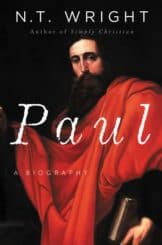
In 1971, Dr. Mary Daly became the first woman to preach at the Memorial Church of Harvard University in its 336-year history. Selecting her Biblical texts, she wove together what Rev. Dr. Peter J. Gomes, also of Harvard, would later call “all of the most offensive passages of St. Paul, stitched together in one grim tapestry of Scripture.”
1 Corinthians 14:34 likely earned a square in the tapestry: “Women should remain silent in the churches. They are not allowed to speak, but must be in submission, as the law says.”
1 Timothy 2:12 surely made an appearance: “I do not permit a woman to teach or to assume authority over a man; she must be quiet.”
With these texts as her backdrop, Dr. Daly used her historic sermon to condemn the patriarchal legacy of Paul and his letters. As the sermon reached its climax, she invited women in the congregation to join her in an act of protest against patriarchal domination—walking out before the service had ended in what she called “an exodus from centuries of darkness.”
Reflecting on the experience decades later, Rev. Gomes summarized the sense that “Paul was a problem, Paul created difficulties, and Paul was a hindrance to the full inclusion of half the human race in the Christian faith.”
“Who,” Dr. Gomes asked rhetorically, “doesn’t have a problem with Paul?”
Today, people continue to wrestle with Paul. Just witness the furor surrounding Attorney General Jeff Sessions’ attempts to use the first few verses of Romans 13 to justify the United States government separating children from their asylum-seeking parents. (Astute observers noted that the same passage was used to bolster pro-slavery arguments in the run-up to the American Civil War.)
How do we solve a problem like the Apostle Paul?
How do we solve a problem like Apostle Paul? For the Rev. Dr. N. T. Wright, who has devoted much of his illustrious academic and pastoral career to making sense of the Apostle Paul, part of the solution lies in history.
Following the release of his four-part, two-volume academic tome Paul and the Faithfulness of God (part of his Christian Origins and the Question of God series), Wright has released another book exploring the problem—and promise—of Paul’s life and writings.
Written for a general audience, Paul: A Biography seeks to invite readers into the life and mind of Paul as a human being.
“We know Paul by reading [his letters],” Wright said in an interview, “but the point was to try to get inside the political, cultural contexts, which are very complex in Paul’s world.” Inspired in part by the biographies of Cicero written by Robert Harris, Wright uses the surviving historical documents, including the New Testament, to explore Paul’s upbringing as a zealous Jew, his dramatic conversion on the Road to Damascus, and his ministry and service in the early church. Far from seeing Paul as a paragon of outdated, retrograde values of patriarchy and systemic racism, Wright finds in Paul’s life the hallmarks of genuine faith in Christ.
Far from seeing Paul as a paragon of outdated, retrograde values of patriarchy and systemic racism, Wright finds in Paul’s life the hallmarks of genuine faith in Christ.
On questions of women in ministry, for example, Wright finds that the historical reality doesn’t match the later patriarchal abuses. “When you think into the actual historical situation, then you see that Paul not only values women as fellow workers in Christ, he entrusts one of them [Phoebe] to be the first person to expound the letter to the Romans.”
Similarly, Wright is adamant that Paul is a source of inspiration and understanding for the church in racially polarized times. “Every time the church goes back to Paul,” Wright says, “it gains fresh wisdom on the unity of the church across traditional cultural boundary markers.”
“Going back to Paul,” though, doesn’t mean simply reading English translations of his surviving Greek letters. In Wright’s eyes, going back to Paul means attempting to think Paul’s thoughts in Paul’s way, striving to understand his historical situation, and seeing him as a frail and fallible human being used by God to bring the Good News of Jesus to Jew and Gentile alike.
In Paul: A Biography, Wright opens the door for Christians to embark on our own exodus from darkness into a brighter understanding of the writings of the Apostle Paul.
Jon Carlson serves as Lead Pastor of Forest Hills Mennonite Church outside of Lancaster, PA. Jon and his wife, Lyn, are raising three kids who seem to have endless supplies of energy. Follow on Facebook, Twitter, or Instagram.


